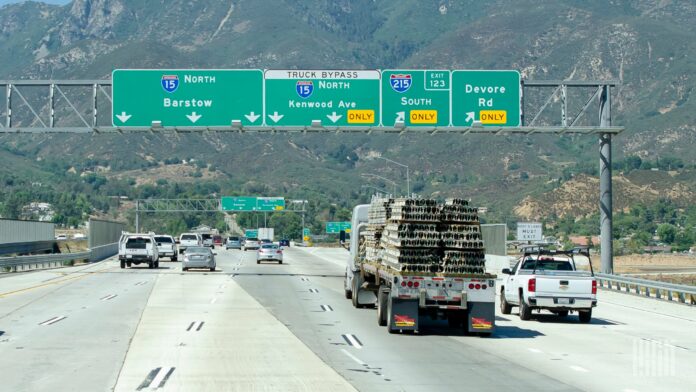The trucking industry in California is currently facing a period of uncertainty following the demise of the Advanced Clean Fleets (ACF) rule. The California Air Resources Board (CARB) recently withdrew its waiver request under the Clean Air Act to the Environmental Protection Agency, effectively putting an end to the ACF. While the Advanced Clean Trucks (ACT) rule still stands with an EPA waiver, the future of zero-emission vehicles in the state remains uncertain.
According to Glen Kedzie, a specialist in environmental regulations impacting trucking, the move towards electrifying trucks in California is essentially dead for the time being. The decision to withdraw the waiver request was not solely influenced by the change in administration, as some had speculated. Instead, concerns were raised about the feasibility and practicality of the ACF goals, leading to doubts about its implementation.
The ACF aimed to phase out internal combustion engine trucks in California by 2045, with strict regulations on truck sales and emissions limits. However, feedback from industry experts highlighted challenges such as grid infrastructure constraints and the ambitious nature of the goals set by the ACF. As a result, the EPA may have had reservations about the rule’s workability, prompting CARB to reconsider its approach.
While the withdrawal of the waiver request may have been influenced by political factors, the trucking industry is now faced with a dilemma. The ACT rule mandates the sale of zero-emission vehicles in California, but without the ACF in place, there is no longer a requirement for trucking companies to invest in these vehicles. This has created confusion and uncertainty within the industry, as stakeholders navigate the changing regulatory landscape.
Mike Hoheisel, a truck sales expert, highlighted the interconnected nature of the ACF and ACT rules, noting that they were designed to complement each other. The withdrawal of the ACF waiver has complicated matters further, especially for engine manufacturers who had previously aligned with California’s regulations. The decision has also impacted other states that had agreed to follow California’s lead on clean truck requirements.
Moving forward, industry experts emphasize the need for a more realistic and feasible approach to zero-emission vehicles in California. While the goals of the ACF were ambitious, there is a recognition that practical challenges must be addressed for successful implementation. The recent developments have underscored the complexities of transitioning to a cleaner trucking fleet and the importance of aligning regulatory goals with industry capabilities.
In conclusion, the trucking industry in California is at a crossroads following the withdrawal of the ACF rule. While the ACT rule remains in place, stakeholders must now reassess their strategies and priorities in light of the changing regulatory environment. By addressing the practical challenges and working towards achievable goals, the industry can make progress towards a more sustainable and environmentally friendly future for trucking in California. The California Air Resources Board (CARB) has compiled a list of 10 states that have chosen to adopt California’s vehicle emission standards, particularly the Advanced Clean Truck (ACT) standard. These states include Colorado, Maryland, Massachusetts, New Jersey, New Mexico, New York, Oregon, Rhode Island, Vermont, and Washington. Notably, CARB has reported that no states are currently following the ACT.
The implementation of the ACT has posed challenges for the sales of internal combustion engine (ICE) diesel trucks in the states that have signed on to the program. The requirement to sell Zero Emission Vehicles (ZEVs) in order to offset the sales of ICE diesel trucks has created a dilemma for dealerships and staff. This shift in the market dynamics may lead to a decline in diesel sales in the ACT states, impacting both sales and operations within the industry.
There is also uncertainty surrounding the potential revocation of the waiver granted to CARB by the Trump administration in March 2023 to implement the ACT. The American Truck Dealers Association has expressed support for revoking the remaining waivers, emphasizing the need for emissions regulations that align with market realities.
As the ACT faces potential challenges and changes, stakeholders are considering the implications on fleets and the trucking industry. The end of the ACT could result in the termination of certain mandates, such as only allowing ZEV vehicles to be registered with California’s drayage registry after January 1, 2024. While some requirements of the ACT may not have an immediate impact on new truck sales, the shift in regulations could have lasting effects on the industry.
Despite the uncertainty surrounding the future of the ACT, efforts to reduce emissions and promote cleaner technologies remain a priority. Stakeholders are exploring alternative solutions, such as natural gas-fueled vehicles, to address emission concerns in the absence of ZEV mandates. The Southern California Air Quality Management District’s Indirect Source Rule may incentivize the adoption of lower-emission vehicles, potentially leading to a shift towards cleaner technologies in the industry.
In conclusion, the evolving landscape of emissions regulations and clean truck standards presents both challenges and opportunities for the trucking industry. As states navigate the complexities of implementing the ACT and meeting emission reduction goals, stakeholders must adapt to changing market dynamics and explore innovative solutions to promote sustainability and environmental stewardship in the transportation sector.



